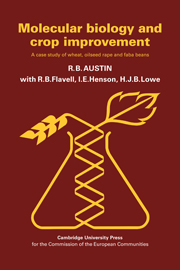7 - Conclusion
Published online by Cambridge University Press: 04 August 2010
Summary
Recombinant DNA technology is a rapidly developing subject which offers many entirely new opportunities for making directed changes to plant genotypes. It may supplement the many techniques already used by breeders to increase the yield, pest and disease resistance and quality of crops, but has not yet been demonstrated to be generally useful. Provided that an appropriate level of funding is maintained, and appropriate collaboration between scientists working at different levels is achieved, the next two decades should permit the new technology to be further developed and properly tried and tested. To facilitate this, it is necessary to identify objectives for plant transformation which are thought to be biologically possible and economically desirable. Where conventional genetic methods can be used to modify plants, they will often be easier and so preferable to methods based on gene isolation and transfer. However, the latter may prove to be the only means for transferring genes from widely different organisms. Table 7.1 shows which of the different techniques of plant molecular biology can presently be applied to each of the three crops covered by this report.
Plants which have been genetically engineered by recombinant DNA technology to introduce a desired gene or trait will need to be subjected to rigorous testing in the same way as the segregating progenies from conventional breeding programmes. Further, the exploitation of particular new or altered genes may require adjustment of the general genetic background which can only be achieved by using the genes in conventional breeding programmes.
- Type
- Chapter
- Information
- Molecular Biology and Crop ImprovementA Case Study of Wheat, Oilseed Rape and Faba Beans, pp. 101 - 110Publisher: Cambridge University PressPrint publication year: 1986



